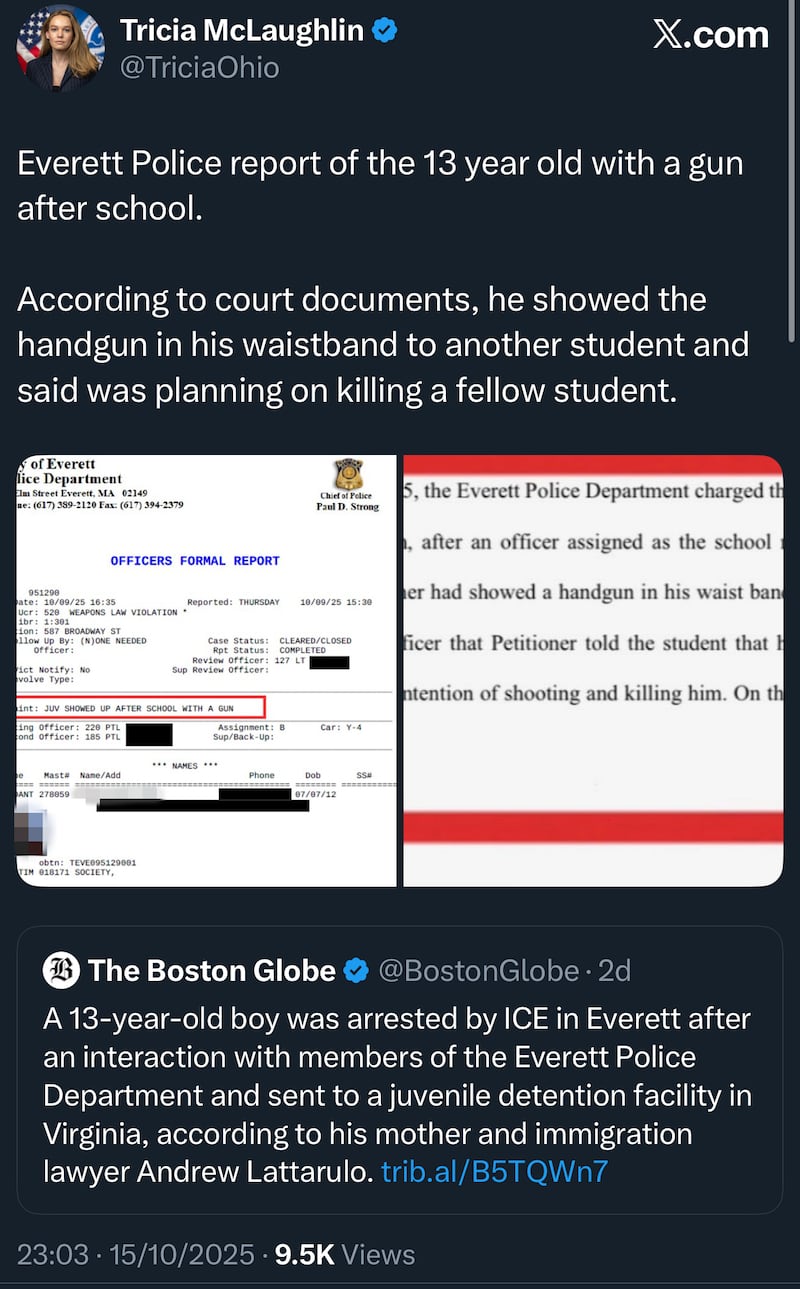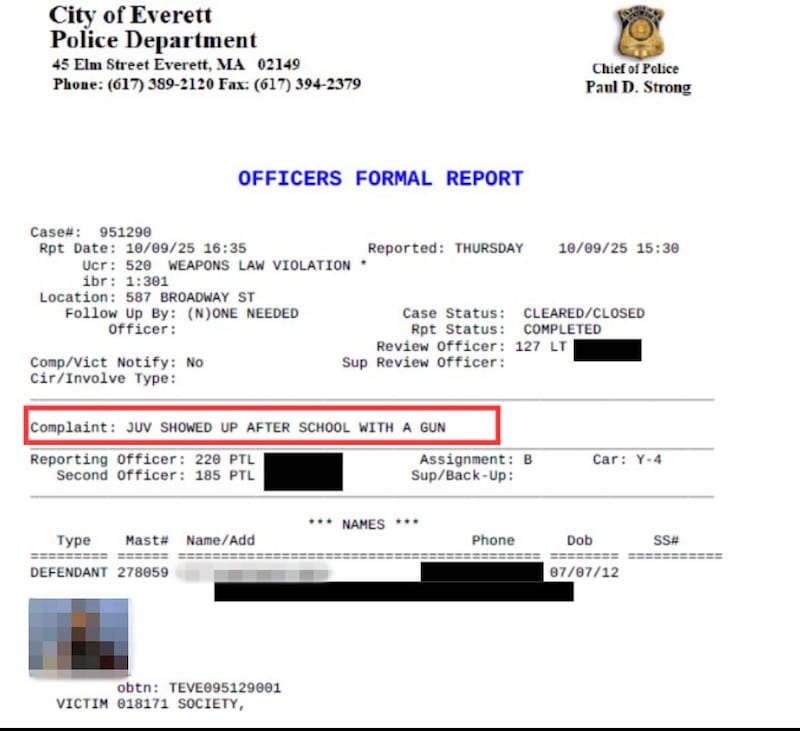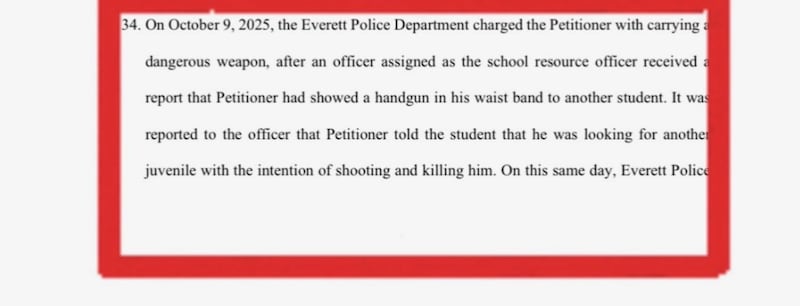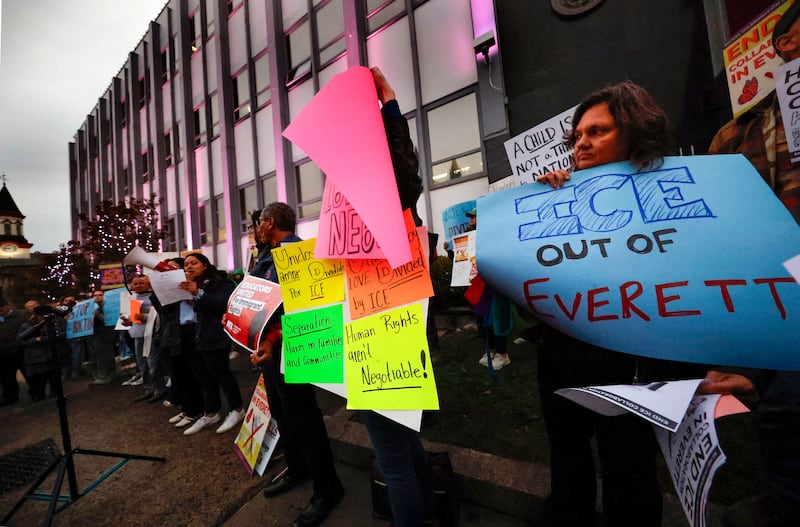The Department of Homeland Security and its top communications officer are facing calls to be investigated amid claims from legal experts that they may have broken state and federal law, as well as their own internal guidelines, by revealing the identity, alleged criminal history, and police photo of a child detained by ICE.
On multiple occasions, Assistant Homeland Security Secretary Tricia McLaughlin—at the age of 31 the most senior public affairs official to Homeland Security Secretary Kristi Noem—made public what she and DHS allege are previous criminal convictions against the 13-year-old schoolboy.
Following reports that the seventh-grader had been taken by federal agents to a juvenile detention center more than 500 miles away from his family in Everett, Massachusetts, DHS and McLaughlin used their social media to try to quell growing public anger around the case. They claimed that the boy had an “extensive rap sheet,” while listing some of his apparent past offenses. They also stated—falsely, it transpired—that he had been in possession of a firearm.

Later, in response to the city’s police chief and mayor denying their claims that the boy had a gun, McLaughlin on Wednesday shared with her 87,000 X followers the Everett Police “Officers Formal Report” and an apparent excerpt pertaining to the incident. The report included the boy’s name, date of birth, and police mugshot, with his face clearly visible. DHS then reposted it to its 2.7 million followers.
On Thursday, the department doubled down, and a “high-ranking Trump administration official” released to Fox News Digital an immigration court document naming the child, alleging he is tied to a notorious gang, and stating he was a “public safety threat.” In an article headlined “DHS flips the script on media narrative,” the outlet also listed the boy’s alleged criminal history of “11 police complaints” that included “breaking and entering, vandalism, theft, fighting, ‘flash mob’ style shoplifting and more.”

Now five lawyers and legal experts have told the Daily Beast that the actions of DHS and McLaughlin have likely breached strict juvenile-privacy laws both at federal and state level—as well as DHS’s own internal guidelines—that protect kids’ identities and criminal records.
Law scholar Nora Demleitner, who until June was president of St. John’s College and is an elected member of the exclusive American Law Institute, told the Beast that DHS and McLaughlin were either “oblivious to legal and ethics rules surrounding the release of juvenile records, or they don’t care.”
Leonard Sipes, who has 35 years of experience responding to media inquiries for federal and state justice agencies, was more generous, saying DHS and McLaughlin may have made an “honest mistake” while working under pressure, which is “an inevitable consequence of huge agencies with national responsibilities.”

But Austin-based criminal defense attorney Sam Bassett said that was no excuse: “Juvenile matters, with rare exception, are confidential proceedings and the juvenile’s name cannot be published and proceedings are not held in public. Confidentiality is critical to the juvenile justice system and publicly releasing evidence in a juvenile case is prohibited in every state. Consequences for doing so may vary from state to state.”
New Mexico criminal defense lawyer John W. Day went further still: “There are no exceptions that would permit DHS to release to the public juvenile history and juvenile mugshots just to try to deflect criticism about ICE activity.” He added: “These are clearly intentional and willful violations by DHS officials of federal and state laws that protect information about juveniles in the criminal justice system.”
The Federal Juvenile Delinquency Act requires that juvenile records “be safeguarded from disclosure to unauthorized persons,” and, unless a juvenile is prosecuted as an adult, “neither the name nor picture of any juvenile shall be made public in connection with a juvenile delinquency proceeding.”

Massachusetts law is also explicit about such actions. It says records “in cases of delinquency shall be withheld from public inspection except with the consent of a justice of the court,” while only youthful offender proceedings conducted pursuant to indictment are treated like adult cases.
The state’s court guidance demands that juvenile records are sealed to avoid branding children forever for acts committed while still developing. While “youthful offender” cases indicted into open adult court can be made public, those are the exception. But because the boy is 13 and there’s no indictment, the matter remains a juvenile delinquency case with the usual confidentiality protections.
Leading criminal defense attorney Michael Alber, who is based in New York, said: “It is appropriate to consider the prior conduct of an accused. However, the release of a juvenile’s prior history without court approval, while providing transparency for the public is not appropriate given the safeguards in place, and if allowed could open the floodgates to completely undoing what the legislature has intended, which is the privacy of such records.”
Potential repercussions for DHS employees are not merely legal, either. DHS’ own privacy guidance restricts disclosure of federal juvenile-delinquency information by DHS components, and federal employees can face administrative action, referral to its own watchdog, the Office of Inspector General (OIG). DHS also identifies ICE records systems as subject to the Privacy Act, and unauthorized disclosure can lead to discipline and civil liability for the agency.
Los Angeles-based criminal defense attorney Arash Hashemi said the actions of DHS and McLaughlin “could lead to serious consequences inside the government, such as an Inspector General investigation, disciplinary action, or even congressional scrutiny.” California attorney Tracey Gallagher warned on X that DHS and McLaughlin could face tough questions from oversight bodies already probing handling of minors’ data.
The controversy first ignited on Oct. 12. The Boston Globe reported that the Brazilian-born boy, whose family had sought asylum in the U.S. in 2021 and are still going through the asylum process, had been arrested on Oct. 9 “after an interaction with members of the Everett Police Department and sent to a juvenile detention facility in Virginia,” according to the boy’s mother and immigration lawyer Andrew Lattarulo.

Amid public anger, McLaughlin’s initial post a day later attempted to explain ICE’s actions, by suggesting the boy had been carrying a “firearm” and had an “extensive rap sheet.” DHS then repeated the claim. However, at a City Hall news conference last Tuesday, Mayor Carlo DeMaria and Police Chief Paul Strong said officers had recovered a 6–7 inch double-edged knife from the boy during the arrest at Albert N. Parlin School but “no firearm.” They did not discuss the child’s identity or his alleged criminal past.
Having been approached by the Daily Beast for comment, McLaughlin said last Wednesday: “We pray you start listening to the facts instead of swallowing every leftist talking point that’s fed to you.” When asked if by “leftist” she meant the police chief and mayor, McLaughlin did not respond. She later told the Beast: “We stand by our statements and the facts.”
Hours later, with online anger at McLaughlin’s statements and posts growing, she went further still in her attempt to defend her actions in having erroneously suggested that the boy had a gun when she uploaded what she said was the “Everett Police report of the 13 year old with a gun after school,” while claiming the boy “showed the handgun in his waistband” and planned to kill a student.
The document she posted lists a “complaint” that a juvenile “showed up after school with a gun” and includes the boy’s booking image—but, by its own terms, is a report, not proof that a gun existed. That was followed by Fox Digital’s detailed rundown of the various police complaints allegedly made against the child, including his name, which had been handed to the outlet by the unnamed “high-ranking” Trump administration official.
It is not the first time that McLaughlin has come under fire for making false public proclamations about ICE raids—with the agency under scrutiny for its heavy-handed immigration raids as it tries to meet the White House’s 3,000 deportations target—even in the past week.
Last Tuesday, the Beast reported she had made an untrue claim about a video of a hulking ICE officer kneeling on a teenage girl—insisting it was a year-old Chicago burglary arrest unrelated to ICE—before that assertion fell apart.
Amid the furor, Cato Institute’s director of immigration studies, David Bier, on Wednesday dubbed McLaughlin—who acts as the face of DHS in regular TV hits and on social media—the “secretary of lies” over yet another dubious claim she had made on X on Oct. 10, about a U.S. citizen TV producer tackled by border agents. McLaughlin had asserted the woman “threw objects at law enforcement,” which the woman’s attorney denies.
Last month, a Daily Beast investigation exposed how McLaughlin had falsely smeared a mom who lost her baby while locked up by ICE as a wanted killer.
Defending DHS and McLaughlin, Austin-based defense attorney Ronald Chapman II said that they had “a pretty solid defense given the hostility that DHS has faced after allegations of mistreatment of children. If a false story was reported that could lead to injury of her agents—disclosure of the truth may be considered authorized.” He added: “Federal officials are given a wide berth in the performance of their duties.”
But, with the posts all still online despite the claims of the gun having been debunked and the potential child identification violations being flagged to DHS and McLaughlin, Nora Demleitner said: “In administrations that function based on law and ethics rules, [McLaughlin] would already have been removed.”
She added: “The department needs to start its own ethics investigation into the release of information that is considered confidential under state and federal law. As that appears, sadly, unlikely, such investigation falls to Massachusetts officials who should look into her violating Massachusetts or federal laws protecting confidential juvenile records. Without some accountability, the disclosure of private information will become a habit for this administration, which sets a dangerous precedent.”
John W. Day said: “The question is, are there any enforcement teeth available? Would the Commonwealth make any effort to enforce the laws against McLaughlin or any other DHS official involved in the illegal juvenile records release? It’s doubtful the Trump DOJ would want to pursue these violations.”
Arash Hashemi agreed: “Massachusetts could, in theory, bring a legal action for violating its state confidentiality laws, but… a State agency trying to prosecute a Federal agency or agent would automatically create a political circus that no one needs. The more likely fallout would be internal federal investigations or political accountability rather than a state-level criminal case.”
DHS and McLaughlin did not respond to a request for comment by the Daily Beast. The Beast has also reached out to the OIG and the boy’s family for comment.
The post ICE Barbie’s Top Goon Accused of Illegally Revealing Child’s Rap Sheet appeared first on The Daily Beast.




